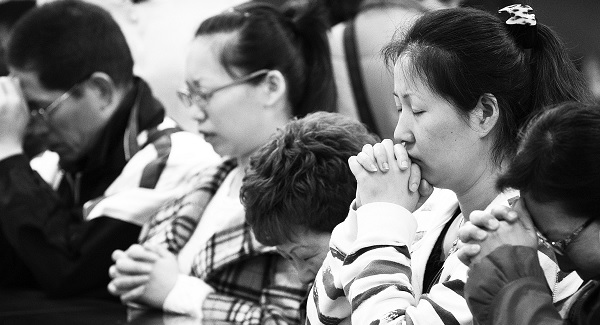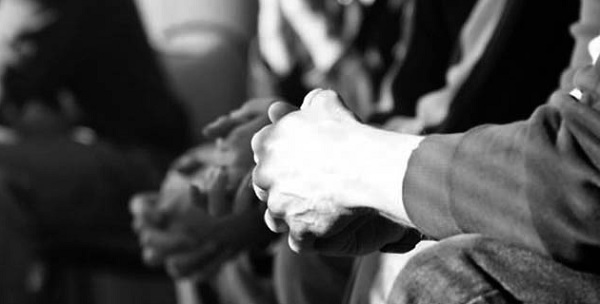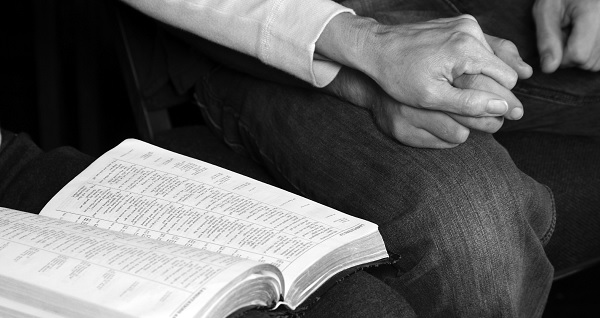Pointers on Prayer:
An interview with Brian Kim of IHOP-KC
By Sloan Milliken

Brian, as we start, can you describe your personal journey in prayer? How has your understanding and practice of it grown and changed over the years?
I grew up in a prayerful Korean family that was part of a very prayerful church. Some of my earliest memories in life are of prayer meetings, especially early morning prayer meetings where I would wake up before the sun was anywhere to be found and attend prayer meetings with my mom and other praying moms and dads in my church.
Those early experiences in life certainly showed me the importance of prioritizing prayer, but even still my vision for prayer was mostly asking God to bless me and help me get good grades in school! It was in this time of my life, however, that I developed a private, personal prayer life where I set aside an hour or two every day to seek the Lord in prayer and study of his Word. To this day, the habit of prayer that I built in those years still bears fruit.
When I was 22 years old, I joined a prayer ministry led by Lou Engle called the Justice House of Prayer. Fresh out of college, I was responsible for training and leading a praying community of about 60 young adults. It was there that I learned to seek God for wisdom in how to serve others and for breakthrough for the people around me.
After 18 months of serving at the Justice House of Prayer in DC, I moved to Kansas City and joined the International House of Prayer. I’ve served for the last 8 years. In Kansas City I have learned that prayer isn’t just a means to getting help from God, but it’s also about enjoying God and his presence. Truly he gives us joy in prayer (see Isa 56:7). I learned that in simply talking to God, I could experience his love and enjoy him always.

What would you say are some of the main roadblocks to God’s people cultivating rich intimacy with him? How do you overcome them in your own life?
I think distractions and the pace of life are the main things standing in the way of people cultivating rich intimacy with God. In the midst of a society that values speed and experiences a constant information overload, we lose the “sacred space” in which we can actually encounter God. Sometimes carving out that space means shutting off our phones, computers, and televisions and being intentional to set aside time to enjoy God in prayer. Personally, I have to schedule times to spend alone with the Lord in a place where I know that I can minimize those distractions. One particular way that I’ve done that is to wake up early in the morning before others in my family are awake and the busy-ness of life sets in. I love early mornings because it becomes my “sacred space” to be alone with the Lord and enjoy his presence.
When God’s people gather together in prayer, demons scatter. But all too often, a prayer meeting is called and the people scatter! What practical advice would you give to people who have it in their heart to start prayer meetings and stir the church to pray?
First, don’t despise the day of small beginnings. Don’t be bothered by the size of your prayer meeting. The Bible tells us that where just two or three are gathered together, he is in the presence of that gathering. Small groups can have big impact!
Second, add music and singing to prayer meetings. I’ve learned that prayer meetings are much more enjoyable when you add worship to those prayer meetings. Singing has a way of opening up our hearts to the Lord. It helps position our hearts to let the word of Christ to dwell in us richly and helps enable us to walk in the Spirit (see Col 3:16 and Eph 5:18-20).
Third, be consistent. Whatever else you may do, be consistent. Humans are creatures of habit, and when we schedule our prayer meetings at consistent times (once a week, once a month, or even daily), people who want to participate can include the prayer meetings into the natural rhythms of their schedule.
Fourth, have a clear focus. There are only a few things worse than participating in a prayer meeting that lacks clear focus! By yourself, or preferably with a small leadership team, determine a clear focus for the time—revival in your church, reaching your city, and the move of the Holy Spirit on your university would be a few possibilities. Having a clear focus allows people to know what to expect each week.
And fifth, pray the Bible. Perhaps most importantly, we want to have unity in our prayer meetings. Nothing builds unity in a prayer meeting more than the Bible. People can come from many different church backgrounds and denominational styles, but if everyone is praying the Bible, it disarms people from worrying about what kind of prayer group they are joining. Moreover, the Lord promises that not one of his words will return void. That means if we pray the Scripture in its context, then we know that he will answer those prayers!
Talk with me some about the importance of corporate prayer. In my experience, when people teach on prayer, the overwhelming focus is on secret place intimacy with the Lord. I love the secret place and am thankful for the many things I have been taught over the years, but it seems as a whole we lack vision and conviction about the importance of corporate prayer. Can you share about how corporate prayer is a blessing to the Lord and his people? I want people to be hungry to seek him together and have vision to sustain that hunger.
You’re right. When people share about prayer, they mostly encourage people to encounter Jesus in the secret place. That is vital to developing a vibrant life in God, but corporate prayer is often not emphasized. But there’s something about corporate prayer that seems to draw the presence of God in a specific way.
In Acts 2:1-2, right before the Lord pours out his Spirit on his people, Luke tells us that Jesus’ disciples had gathered together with “one accord” in “one place” in Jerusalem. After that, the Holy Spirit came in great power in and through them. When we are able to gather “in one accord,” the Lord commands blessing to and through his people (see Ps 133:3, Matt 18:19). Jesus desires this power in unity and agreement in prayer. Though one can put a thousand to flight, two can put ten thousand to flight!
Historically, revival has always been birthed through praying communities. The Welsh Revival, Hebrides Revival, the First and Second Great Awakenings, the 1907 Pyongyang Revival, Azusa Street Revival, and even the current house church movement in China were all birthed and sustained through corporate prayer meetings.
John R. Mott, the primary statesman of the Student Volunteer Movement (one of the most historic young adult movements ever) said this, “If added power attends the united prayer of two or three, what mighty triumphs there will be when hundreds of thousands [or millions!] of consistent members of the Church are with one accord day by day making intercession for the extension of Christ’s Kingdom.”

You are part of a very large community that is giving itself to night and day prayer. Many people when they first encounter IHOP or other praying communities often think that what you’re doing is novel and maybe even a little strange or extreme. Actually, though, the idea is quite old and quite powerful in the Spirit. Would you please talk about the history of praying communities and the impact that they have had on the world for the cause of Christ?
The idea of night and day prayer is nothing novel. Perhaps most famously, the Moravian community of the 1700s was transformed into the first Protestant missions movement shortly after 24 men and 24 women committed themselves to “hourly intercession,” thus praying 24/7. This small prayer room at Herrnhut (in modern-day Germany) sparked a missionary zeal that has rarely been surpassed in church history. This 24/7 prayer meeting lasted nearly 135 years!
Even before the Moravians, Christians in places like Egypt, Turkey, Ireland, and France gave themselves to build praying communities. Some of these groups maintained day and night prayer, even 24/7 prayer, for over 300 consecutive years. Many of these prayer movements also were the most effective communities of evangelism as well.
Please share about what you are doing with your ACTS school and how you are seeing God meet young people in the place of prayer in such a way that equips them and launches them to go to the hardest and darkest places on the planet.
In 2011, we launched the Antioch Center for Training and Sending (ACTS) to equip and send young pioneering leaders to start houses of prayer and plant churches amongst unreached people groups. Since that time, we have sent over 70 long-term missionaries to Muslim, Hindu, and Buddhist people groups. All of these missionaries are in their 20s and 30s. From the place of prayer, they seek to reach out to the lost around them with the good news of Jesus.
Without prayer, it would be very difficult for them to continue their work with joy in these places. Some of the communities that our teams have gone to do not even have one single Christian amongst them, and many times when there are believers among these people groups that our missionaries are trying to reach, the believers are despised and rejected because of their love for Jesus. But the presence of Jesus that they encounter in prayer helps to sustain them in this difficult work.
Moreover, they understand that the Lord does more when we ask him to, especially when we ask him together. Thus, each of our teams have started houses of prayer in their respective regions. They have done this so that other believers can come together, be refreshed as they worship Jesus, and labor in intercession for breakthrough.
One of my favorite things about IHOP is your willingness to encourage people to love Jesus with all they are. Can you share some resources that are available to people?
We absolutely feel like it is a calling of our community to resource the Body of Christ around the world. We have tons of free resources online, much of which can be found at ihopkc.org. From that site, you can pray and worship along with us by streaming the live feed from our 24/7 prayer room and our recently launched All Nations Prayer Room. You can do this through both your computer and your phone. Mike Bickle, our founder and director, has also put all of his teaching notes and resources online at mikebickle.org – it includes 35 years of his teachings! Last, I would point your readers to our IHOPU online. We have classes translated into nine different languages, including Mandarin!
Any parting encouragement?
When approaching prayer, remember that it is meant to be enjoyable, but you need to start somewhere. Don’t worry if you start small—just 5 minutes a day is a beautiful beginning that will cause you to desire more and more!


 Brian Kim is the director of the Antioch Center for Training and Sending (ACTS), a missional movement that exists to train 10,000 young pioneering leaders to plant prayer furnaces and ignite church planting movements in the hardest and darkest places of the earth. He serves on the executive leadership team at the International House of Prayer Missions Base in Kansas City, MO, where he now lives with his wife, Grace, and their children.
Brian Kim is the director of the Antioch Center for Training and Sending (ACTS), a missional movement that exists to train 10,000 young pioneering leaders to plant prayer furnaces and ignite church planting movements in the hardest and darkest places of the earth. He serves on the executive leadership team at the International House of Prayer Missions Base in Kansas City, MO, where he now lives with his wife, Grace, and their children.